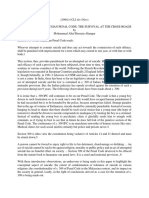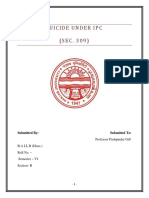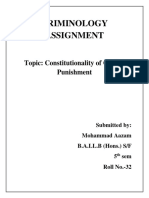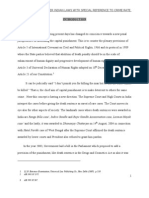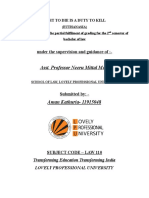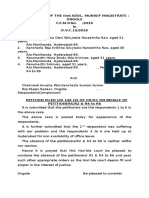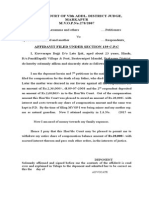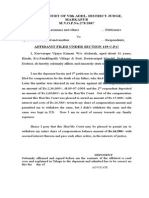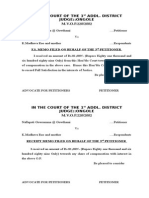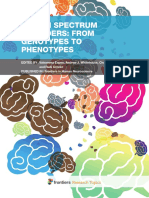16 Is Attempted Suicide An Offence
16 Is Attempted Suicide An Offence
Uploaded by
Vemula Venkata PavankumarCopyright:
Available Formats
16 Is Attempted Suicide An Offence
16 Is Attempted Suicide An Offence
Uploaded by
Vemula Venkata PavankumarOriginal Description:
Original Title
Copyright
Available Formats
Share this document
Did you find this document useful?
Is this content inappropriate?
Copyright:
Available Formats
16 Is Attempted Suicide An Offence
16 Is Attempted Suicide An Offence
Uploaded by
Vemula Venkata PavankumarCopyright:
Available Formats
JIAFM, 2005 : 27 (2).
ISSN 0971-0973
IS ATTEMPTED SUICIDE AN OFFENCE ?
Dr. B.S.Yadwad, Professor & Head
Dr. Hareesh.S.Gouda, Post Graduate student
Dept. of Forensic Medicine, Jawaharlal Nehru Medical College, Belgaum, Karnataka State.
ABSTRACT
Life is a stage with one entrance but many exits. Among those, suicide is one exit having a long
ancestry. In 1968,the World Health Organisation defined suicidal act as "the injury with varying degree of
lethal intent" and that suicide may be defined as "a suicidal act with fatal outcome". Suicidal acts with non
fatal outcome are labeled by World Health Organisation as "attempted suicide." Suicide has been an act
of condemnation as well as commendation through the ages. The act of suicide is forbidden in Khoran
and the Holy Bible. The common belief among Hindus is that a person who commits suicide will not attain
"Moksha" and his Soul will wander around, haunting and tormenting people. In recent times, attempted
suicide, though a failed act has gained more importance (than the suicide, a successful act) since it is
considered as an offence and is punishable under Section 309 of Indian Penal Code. A lot of conflicting
opinions have generated on the desirability of retaining or deleting Section 309 of Indian Penal Code
because of some contrasting judgments given by our Courts. Article 21 of the Constitution of India is a
provision guaranteeing protection of life and personal liberty and by no stretch of the imagination can
extinction of life be read to be included in protection of life. By declaring an attempt to commit suicide a
crime, the Indian Penal Code upholds the dignity of human life, because human life is as precious to the
State as it is, to its holder and the State can not turn a blind eye to a person in attempting to kill himself.
Another set of people are of the opinion that the Section 309 of Indian Penal Code is cruel and irrational
because it provides double punishment for a troubled individual whose deep unhappiness had caused
him to try and end his life. It is cruel to inflict additional legal punishment on a person who has already
suffered agony and ignominy in his failure to commit suicide. And also, what is the legal status of individuals
who, by virtue of their religion refuse food and fast unto death? In India there are innumerable cases
wherein religious ascetics fast to death without State intervening and are not punished though such acts
amount to attempt to suicide.
Key words: Suicide, attempted suicide, Section 306 & 309 of Indian Penal Code, legal anomaly
INTRODUCTION
Life is a stage with one entrance but many
exits. Among those, suicide is one exit having a
long ancestry. The word "Suicide" literally means,
"to kill oneself" (Sui-of oneself and Caedre - to kill)
[1]. In 1968, the World Health Organisation defined
suicidal act as "the injury with varying degrees of
lethal intent" and suicide is defined as "a suicidal
act with fatal outcome [2]. But as per definition it is
difficult to determine whether a particular death was
a suicide since it requires the injuries leading to
death to be self inflicted. This may be obvious in
most cases, but in many others it is impossible to
ascertain. Legally suicide is defined as "the
intentional act of self destruction committed by
someone knowing what he is doing and knowing
108
the probable consequences of his action." Suicidal
acts with non fatal outcome are labeled by World
Health Organisation as "attempted suicide [2]. The
"attempt to suicide" terminology is now
recommended to be used only to denote events in
which there has been a failure of conscious efforts
to end life. These are the people who commit to
end their life through suicide but some how survive.
Suicide has been an act of condemnation as
well as commendation through the ages. The
philosopher's approach considering sacredness of
life, its quality as well as quantity hinges on the
central query - Can a man decide to blow out the
flame? Can he choose death over life? People
have been killing themselves from the beginning
of recorded history. Ramayana and Mahabharata
JIAFM, 2005 : 27 (2). ISSN 0971-0973
have recorded instances of suicide. When Lord Shri
Rama relinquished his life, there was an epidemic
of suicide in Ayodhya. Bhagvad Gita is against self
torture and self killing. During Vedic and
Upanishadic times, apart from "Sati", death from
drowning at the confluence of rivers to achieve
"Punya" (salvation in the next life ) , the self
destruction for incurable diseases, ascetics
undertaking a great journey towards the terminal
years of life ( Mahaprasthan ) , were allowed, but
suicide in general was penalised with the above
exceptions [2] A verse from the Isavaya Upanishad
declares: "He who takes himself (his life) reaches
after death, Sunless regions, covered with
darkness". The Holy Bible contains no law
forbidding man to kill himself, but the taboo that is
tagged on to suicide, coupled with denial of a
decent burial was a deterrent to self destruction by
suicide [3]. Islam asks man and woman to wait for
his/her destiny rather than snatching it from the
hands of Allah. If he does not, he will be depicted
as an unfaithful wretch [2]. The common belief
among Hindus is that a person who commits
suicide will not attain "Moksha" and his soul will
wander around, haunting and tormenting people.
is valid, as it "does not offend" Articles 14 and 21
of the Constitution [5]. In April 1994, a two judge
bench of Supreme Court ( Justice R M Sahai and
Justice B L Hansaria ) had declared the Section
309 of Indian Penal Code void. They observed that
"the right to live (under Article 21 of the Constitution
of India) can be said to bring in its trial the right not
to live a forced life". They declared section 309 of
Indian Penal Code as irrational and cruel. However,
in March 1996, a five judge constitution bench of
the Supreme Court setting aside the earlier
judgement, held that attempted suicide is an
offence under the Indian Penal Code. So, now the
Section 309 of Indian Penal Code continues to be
valid [4]. These judgements opened the door for a
good debate on whether the offence of attempt to
commit suicide under Section 309 Indian Penal
Code should be retained or abolished.
DISCUSSION
Ordinary law makes no provision for the
situation which is considered instinctively natural
for human beings. If some individuals create some
situations, which usually human beings do not
create, the Society has a tendency to look down
upon them as being uncommon or unnatural and
this attitude is reflected in laws. Law presupposes
a society of normal individuals with certain general
instincts. Self preservation is the most general
instinct of humanbeings. In fact, the urge to attempt
to commit suicide runs contrary to the instinctive
urge of the normal individuals who constitute a
majority in the society. Those who attempt to
commit suicide is a minority. It is the instincts of
majority segment of society that give rise to ethics
and morality which lead to uniform norms. So,
attempt to commit suicide is against the generally
accepted norm. Such general norms usually do
not vary from society to society in as much as
human life is the same in every society. And every
civilized society in the world may develop legal
norms against breaches of uniform social norms.
Viewed in this perspective, individual autonomy can
never be granted to the extent of permitting the
individual to take away his life. This is because it is
unnatural and so against the moral stand points of
normal individuals who constitute the society [6].
And also it is not correct to say that the individual
has complete authority over his body and life. His
spouse and children do have claims on his body
Attempted suicide, though a failed act has
gained more importance (than the suicide which is
a successful act) since it is considered as an
offence and is punishable under Section 309 of
Indian Penal Code. According to this Section,
"whoever attempts to commit suicide or any act
towards the commission of such offence shall be
punished with simple imprisonment for a term which
may extend to one year or fine or both [4].
It is because, our legislature makes an offence
dependent on proof of intention. Legally, an act is
INTENTIONAL if it exists in idea before it exists in
fact, the idea realising in itself is the fact because
of the desire it is accompanied with.
A lot of conflicting opinions have generated
on the desirability of retaining or abolishing section
309 of Indian Penal Code because of some
contrasting judgements given by our courts. In
1981, the Delhi High Court condemned the penal
provision (Section 309 of Indian Penal Code) as
"unworthy of human society" and its Bombay
Counterpart, in 1986, held it to be ultravires-on the
ground that it violates Articles 14 and 21 of Indian
Constitution [3]. The Andhra High Court, on the
contrary held that Section 309 of Indian Penal Code
109
JIAFM, 2005 : 27 (2). ISSN 0971-0973
and life. Even if the person is not interested to
keep himself alive, the society, because of its
embedded love for sanctity of life, may have an
interest in the body and life of that individual.
The Supreme Court in 1994 in Rathinam
case, not only declared Section 309 of Indian Penal
Code as being violative of Article 21 and thus
unconstitutional but also conceded constitutional
right to die. In doing so, the Supreme Court seemed
to have relied heavily on the Bombay High Court
decision in Dubal case. The Bombay High Court
argument was plain: the right to one's life also
includes the right to take it away. But on closer
scrutiny, several sub questions of substantial law
surface. The right to buy property implies the right
to sell also. In the same vein, does the right to
one's life also imply the right to dispose off one's
life? Also, do parents "create" the life of their
children? No civilized country would subscribe to
the theory that parents have a right to dispose off
the life of their children because they have created
them.[3]
The right to life is the supreme right from
which no derogation is permitted even in time of
public emergency which threatens survival of the
nation. Article 21 of the Constitution is a provision
guaranteeing protection of life and personal liberty
and by no stretch of the imagination can extinction
of life be read to be included in protection of life.
The right to life is a natural right embodied in this
Article but suicide is an unnatural termination or
extinction of life and, therefore, incompatible and
inconsistent with the concept of right to life.
Thus, by declaring attempt to commit suicide
a crime, the Indian Penal Code uphold the dignity
of human life because human life is as precious to
the State as it is to its holder and the State can not
turn a blind eye to a person's attempt to kill himself.
Another set of people are of the opinion that
the Section 309 of Indian Penal Code is cruel and
irrational because it provides double punishment
for a troubled individual whose deep unhappiness
had caused him to try and end his life. It is cruel to
inflict additional legal punishment on a person who
has already suffered agony and ignominy in his
failure to commit suicide. According to this school
of thought, suicide attempt is very often a cry for
help. The Society owes responsibility towards those
110
who scream out against life because of personal
reasons. They need sympathy and psychiatric help
rather than criminal prosecution.
The Supreme Court judgement of 1996
occasioned unhappiness amongst mental health
professionals across the country. Would any court
decree that vomiting is a criminal offence? Vomiting
is a symptom of an underlying physical illness. In
like manner, an attempted suicide or a completed
suicide is almost invariably a symptom of underlying
psychiatric disorders. Should it then be viewed as
an illegal act? Depression is the commonest
diagnosis associated with suicidal attempt like other
common diagnoses such as alcoholism, drug
abuse, Schizophrenia, etc.[7] All these disorders
require medical and/or psychological therapy. Mc
Naughten's rule can be invoked in the interpretation
of the criminality of an attempted suicide. This rule
represented by Section 84 of Indian Penal Code,
specify that, "Nothing is an offence which is done
by a person who at the time of doing it, by reason
of unsoundness of mind , is incapable of knowing
the nature of the act, or that he is doing what is
either wrong or contrary to Law."[8] Therefore
attempted suicide is not an offence if the person at
the time of committing it, by reason of mental
illness, did not know what he was doing or what he
was doing was either wrong or contrary to Law.
And also a mentally ill person or a person
experiencing intense psychological distress is not
likely to consider legal issues when he
contemplates suicide; and, if he does think of the
law on the subject, he is likely to take precautions
to ensure that his act is successful. Eitherway, the
law on suicide fails to serve as deterrent.
The Supreme Court judgement of 1994
stated that the right to live also implies the right
not to live a forced life.4 In many cases the cause
behind desperate shortcut to death is poverty,
feeling of burden on the family or of the family. Such
people may commit/attempt to commit suicide in
order to relieve themselves of the unbearable
burden of life which may be greater torture than
the pain of death. Supporters of this theory ask
"Does the State today have a right to force a person
to stay alive, when the state itself can not provide
him means of a decent livelihood?
Persons who attempt suicide therefore
require assistance in their physical and
JIAFM, 2005 : 27 (2). ISSN 0971-0973
psychological life and not punishment by fine and/
or imprisonment. Penal deterrents are better suited
to criminal act, not acts of distress. Hence the
Section 309 of Indian Penal Code deserves to be
effaced from the statute book to "humanise our
penal laws". In this connection, in 1971, the Law
Commission recommended the abolition of Section
309 of Indian Penal Code. The then Government
of India accepted the recommendation but could
not pass the bill in the Lok Sabha in 1979 as the
elected body was dissolved and the bill elapsed.[2]
technological solutions. As long as medicine
depends on science and science promises hope,
there is always hope for mankind and people who
make decision should make them judiciously.
Some are of the view that if attempt to suicide
is not an offence then the section 306 of Indian
Penal Code becomes unconstitutional. Section 306
of Indian Penal Code defines abetment of suicide
and punishment for the same. But offences defined
under both these Sections are distinct offences and
Section 306 of Indian Penal Code can survive
independent of Section 309 of Indian Penal Code.
It is said that Suicide is a legal anomaly
wherein an attempted act is punishable while an
accomplished act is not!
In democracy, law making is a public exercise.
Resultantly, a legislative empowerment in contrast
to an executive aggrandizement of power can not
occur without public scrutiny. The Constitution,
however, does not just require a legislative
procedure but the one, which is just fair, reasonable
and acceptable to the society at large.
Should we, today, in the ever changing trends
of the Society continue with and adhere to this
anomaly?
References
What is the legal status of individuals who by
virtue of their religion refuse food and fast to death?
In India there are innumerable cases wherein
religious ascetics fast to death without the State
intervening and are not punished though such acts
amount to attempt to suicide. For example, in
February 1988, a 82 years old Jain ascetic starved
himself to death in Sonepat in Haryana. In April
1993, a female Jain monk starved herself to death
in Kutch District. In April 1993, Bangalore Police
registered a case of attempted suicide against a
Bollywood actress. Cases were similarly registered
against some of the 22 youths who attempted selfimmolation during the anti Mandal Stir in 1991.5
Seeing the different State responses to these
cases, a simple question leaps up the mind. Why
an actress is charged with attempted suicide but
not Jain monks starving themselves to death?
Does this double standard mean that the State
condones a slow suicide but not a quick one?
CONCLUSION
Therefore it is, however, not to say that the
Indian Penal Code is a modern code in every sense
of the term. It requires change to meet the aims
and aspirations of contemporary society. Ultimately
the endeavour should be to evolve a consensual
and conceptual model effectively tackling the evils,
without sacrificing human rights.
Social problems cannot be solved by applying
111
1.
Taber's cyclopedic medical dictionary. 17th
ed. New Delhi: Jaypee brothers; 1993.
Thomas CL; p.1905.
2.
Unni KES. Human self destructive behaviour.
In: Vyas JN, Ahuja N, editors. Textbook of
postgraduate psychiatry. 2nd ed (reprint).
Volume 2. New Delhi: Jaypee brothers; 2003.
p.526-556.
3.
Theophilus HJ. To be or not to be. Deccan
Herald. 1996 May 5.
4.
Munjal GC, Ahuja N. Forensic psychiatry.In:
Vyas JN, Ahuja N, editors. Text book of
postgraduate psychiatry. 2nd ed (reprint).
Volume 2. New Delhi: Jaypee brothers; 2003.
p.998-1018.
5.
Kala A. Suicide: SC Covers historic milestone
in judicial history. Deccan Herald 1994 May
9.
6.
Pillai KNC. Comment on Rathinam v Union
of India. Available from: http:www.ebcindia.com/lawyer/articles/95 v 3a 1. htm (
accessed on 24-11-2005 )
7.
Ahuja N. A short textbook of psychiatry. 4th
ed.New Delhi: Jaypee brothers; 1999: p.203210.
8.
Reddy KSN. The essential of Forensic
Medicine and Toxicology. 22nd ed.
Hyderabad. 2003 : p.395.
You might also like
- Written Statement of 2nd Respondent in m.v.o.p.no.382-2011-Cholamandalam-InjuryDocument6 pagesWritten Statement of 2nd Respondent in m.v.o.p.no.382-2011-Cholamandalam-InjuryVemula Venkata Pavankumar100% (2)
- Section 309 of Malaysian Penal CodeDocument10 pagesSection 309 of Malaysian Penal CodeKay KayNo ratings yet
- Or 32 R 12 C.P.C. Major 278 2007 5th PetitionerDocument3 pagesOr 32 R 12 C.P.C. Major 278 2007 5th PetitionerVemula Venkata Pavankumar100% (2)
- JUSTICE Delayed Is Justice DeniedDocument3 pagesJUSTICE Delayed Is Justice DeniedVemula Venkata PavankumarNo ratings yet
- Adult ADHD in The Arab World: A Review: Ghinwa El Hayek, Dahlia Saab, Claudia Farhat, Zaher Krayem, Elie KaramDocument23 pagesAdult ADHD in The Arab World: A Review: Ghinwa El Hayek, Dahlia Saab, Claudia Farhat, Zaher Krayem, Elie KaramMohamed AbozeidNo ratings yet
- Scott Stewarts Surviving Schizophrenia Story PDFDocument113 pagesScott Stewarts Surviving Schizophrenia Story PDFscott stewartNo ratings yet
- Periodiacal Test Grade 7 3rd QuarterDocument4 pagesPeriodiacal Test Grade 7 3rd QuarterEarl Longyapon Francisco100% (6)
- Attempt To Commit SuicideDocument6 pagesAttempt To Commit SuicideRounak SinhaNo ratings yet
- Suicide ProjectDocument23 pagesSuicide ProjectUday singh cheemaNo ratings yet
- Decriminalization of Attempt To Commit SuisideDocument17 pagesDecriminalization of Attempt To Commit SuisideHarsh DixitNo ratings yet
- Abolition of Death Penalty PDFDocument5 pagesAbolition of Death Penalty PDFDebakanta MohantyNo ratings yet
- Right to die 2Document13 pagesRight to die 2Cumene anisoleNo ratings yet
- Decriminalisation of Section-309 of IPC.Document6 pagesDecriminalisation of Section-309 of IPC.soham kaleNo ratings yet
- Decriminalisation of Attempt To SuicideDocument11 pagesDecriminalisation of Attempt To SuicidePallavi LakheraNo ratings yet
- Suicide - Attempt To Commit Suicide - Abetting SuicideDocument18 pagesSuicide - Attempt To Commit Suicide - Abetting SuicideniravmodyNo ratings yet
- SuicideDocument4 pagesSuicideUtkarsh AnandNo ratings yet
- Suicide ProjectDocument25 pagesSuicide Projectkrati123chouhanNo ratings yet
- Attempt to suicide.Document6 pagesAttempt to suicide.archinayak11No ratings yet
- Decriminalization of Attempted SuicideDocument3 pagesDecriminalization of Attempted SuicideurvashiNo ratings yet
- Suicide Laws in IndiaDocument7 pagesSuicide Laws in IndiaTanay MehtaNo ratings yet
- Constitutional Law Sem-2Document12 pagesConstitutional Law Sem-2richa ayengiaNo ratings yet
- National Law Institute University, BhopalDocument10 pagesNational Law Institute University, BhopalKapil KaroliyaNo ratings yet
- MPHRC Internship Assignment/ProjectDocument30 pagesMPHRC Internship Assignment/ProjectPranshu MalviyaNo ratings yet
- Law Commission's ReportDocument25 pagesLaw Commission's ReportmanikaNo ratings yet
- Criminology Assignment: Topic: Constitutionality of Capital PunishmentDocument14 pagesCriminology Assignment: Topic: Constitutionality of Capital PunishmentTaiyabaNo ratings yet
- Attempt To SuicideDocument12 pagesAttempt To Suicidemehak0% (1)
- 4 Issue 3 Intl JLMGMT HumanDocument9 pages4 Issue 3 Intl JLMGMT Humanrosesarahp204No ratings yet
- Development of Law of Suicide in IndiaDocument9 pagesDevelopment of Law of Suicide in IndiaHarshdeep SinghNo ratings yet
- Legal Methods Project - Shrida SupunyaDocument20 pagesLegal Methods Project - Shrida SupunyaShrida SupunyaNo ratings yet
- Section 309 of The Indian Penal CodeDocument2 pagesSection 309 of The Indian Penal CodegdhtyNo ratings yet
- Euthanasia and Human RightsDocument8 pagesEuthanasia and Human RightsMitheleshDevarajNo ratings yet
- Right To Die: A Right or An Assisted Suicide: Submitted By: Inderpreet Suman Reg - No11605106 Section-L1601Document10 pagesRight To Die: A Right or An Assisted Suicide: Submitted By: Inderpreet Suman Reg - No11605106 Section-L1601inderpreetNo ratings yet
- Euthanasia and Human RightsDocument5 pagesEuthanasia and Human RightsMohit SharmaNo ratings yet
- MAIN ProjectDocument57 pagesMAIN ProjectprabhashchandNo ratings yet
- Synopsis On Dead and NecrophiliaDocument9 pagesSynopsis On Dead and NecrophiliaTushar KapoorNo ratings yet
- Rajnandini Panwar 0231llb063 Isha Goel 0231llb022Document22 pagesRajnandini Panwar 0231llb063 Isha Goel 0231llb022ishagoel08No ratings yet
- Ethunasia in IndiaDocument4 pagesEthunasia in IndiaSuvedhya ReddyNo ratings yet
- Research Paper (Honour Killing)Document8 pagesResearch Paper (Honour Killing)Harsh Garg100% (1)
- Right TO DIE Submitted To:-Mr - Rasheed Ca Submitted By: - Umang Dixit Ballb (Hons) (Regular) 2 YearDocument18 pagesRight TO DIE Submitted To:-Mr - Rasheed Ca Submitted By: - Umang Dixit Ballb (Hons) (Regular) 2 YearShardendu PandeyNo ratings yet
- Criminology Assignment: Topic: Constitutionality of Capital PunishmentDocument15 pagesCriminology Assignment: Topic: Constitutionality of Capital PunishmentMohammad AazamNo ratings yet
- Right To Commit Suicide in India A Comparative Analysis With Suggestion For The PolicymakersDocument15 pagesRight To Commit Suicide in India A Comparative Analysis With Suggestion For The Policymakerssushilshahdelhi2No ratings yet
- Ekjot Kaur-De-criminalization of Attempt To SuicideDocument16 pagesEkjot Kaur-De-criminalization of Attempt To SuicideSaurabh SinghNo ratings yet
- Seminar Presentation 1Document5 pagesSeminar Presentation 1SHRUTI SINGHNo ratings yet
- Position of Euthanasia in IndiaDocument4 pagesPosition of Euthanasia in IndiaP K GautamNo ratings yet
- Capital Punishment: Jamia Millia IslamiaDocument13 pagesCapital Punishment: Jamia Millia Islamiakhushbu guptaNo ratings yet
- Right To Die With Dignity - Ipleaders - Reader ViewDocument5 pagesRight To Die With Dignity - Ipleaders - Reader ViewPankaj NarwalNo ratings yet
- Fifth Execption To MurderDocument16 pagesFifth Execption To Murdershaitan singhNo ratings yet
- 21BAL080 - Abhishek Nenuji - Blog On Death Penalty in IndiaDocument4 pages21BAL080 - Abhishek Nenuji - Blog On Death Penalty in IndiaAbhishek NenujiNo ratings yet
- Report On Honour KillingDocument11 pagesReport On Honour KillingShailja ChandolaNo ratings yet
- criminal justice research paperDocument7 pagescriminal justice research paperBhavya SinghNo ratings yet
- School of Law, Narsee Monjee Institute of Management Studies, BangaloreDocument17 pagesSchool of Law, Narsee Monjee Institute of Management Studies, BangaloreSaurabh Krishna SinghNo ratings yet
- Attempt To Commit Offences 2Document8 pagesAttempt To Commit Offences 2suvrajeetsahoo81No ratings yet
- Asst. Professor Neeru Mittal Mam: Under The Supervision and Guidance OfDocument14 pagesAsst. Professor Neeru Mittal Mam: Under The Supervision and Guidance OfKathuria Aman100% (1)
- Capital Punishment in Bangladesh: Criminal Procedure 1898 Provides That "He Be Hanged by The Neck Until He Is Dead."Document10 pagesCapital Punishment in Bangladesh: Criminal Procedure 1898 Provides That "He Be Hanged by The Neck Until He Is Dead."Nayem KhanNo ratings yet
- JURISPRUDENCEDocument23 pagesJURISPRUDENCEslokavcNo ratings yet
- Article 21 of The Constitution of India (1949) : Mental Healthcare Act, 2017Document4 pagesArticle 21 of The Constitution of India (1949) : Mental Healthcare Act, 2017Rockstar KshitijNo ratings yet
- DocumentDocument8 pagesDocumentchetna manchandaNo ratings yet
- Right To Die Vis A Vis Sec 309 IpcDocument4 pagesRight To Die Vis A Vis Sec 309 IpcMudita SaxenaNo ratings yet
- Right To Life With Dignity Also IncludesDocument5 pagesRight To Life With Dignity Also IncludesAkashNo ratings yet
- Consti ProjectDocument4 pagesConsti ProjectGAURI DHINGRANo ratings yet
- Abolition of Death PenaltyDocument16 pagesAbolition of Death PenaltyAditi BhawsarNo ratings yet
- 09 - Chapter 3Document33 pages09 - Chapter 3AnantHimanshuEkkaNo ratings yet
- Is Time To Abolish The Death PenaltyDocument3 pagesIs Time To Abolish The Death Penaltyditipriya mukherjeeNo ratings yet
- Consti-Right To Die ScribdDocument18 pagesConsti-Right To Die ScribdVanessa ThomasNo ratings yet
- Euthanasia FootnotesDocument5 pagesEuthanasia FootnotesPriyadarshan NairNo ratings yet
- Delay Condonation-CC - 2017-Md - RafiDocument4 pagesDelay Condonation-CC - 2017-Md - RafiVemula Venkata Pavankumar50% (2)
- Received Document in MVOP-100-2016Document4 pagesReceived Document in MVOP-100-2016Vemula Venkata PavankumarNo ratings yet
- Absent Petition in DVC 12-2016Document3 pagesAbsent Petition in DVC 12-2016Vemula Venkata Pavankumar50% (2)
- Implead Petition in MVOP-61-2016Document6 pagesImplead Petition in MVOP-61-2016Vemula Venkata PavankumarNo ratings yet
- Injury-MVOP - 2015-Angadi LakshmanDocument7 pagesInjury-MVOP - 2015-Angadi LakshmanVemula Venkata Pavankumar100% (2)
- Permission Petition 278 2007 9th PetitionerDocument3 pagesPermission Petition 278 2007 9th PetitionerVemula Venkata PavankumarNo ratings yet
- Permission Petition 278 2007 7th PetitionerDocument3 pagesPermission Petition 278 2007 7th PetitionerVemula Venkata PavankumarNo ratings yet
- Before The Motor Accident Claims TribunalDocument3 pagesBefore The Motor Accident Claims TribunalVemula Venkata PavankumarNo ratings yet
- Permission Petition 278 2007 6th PetitionerDocument3 pagesPermission Petition 278 2007 6th PetitionerVemula Venkata PavankumarNo ratings yet
- Permission Petition 278 2007 7th PetitionerDocument3 pagesPermission Petition 278 2007 7th PetitionerVemula Venkata PavankumarNo ratings yet
- Permission Petition 278 2007 5th PetitionerDocument3 pagesPermission Petition 278 2007 5th PetitionerVemula Venkata PavankumarNo ratings yet
- MP CJ 2015 English 231215Document9 pagesMP CJ 2015 English 231215Vemula Venkata PavankumarNo ratings yet
- Permission Petition 278 2007 1st PetitionerDocument3 pagesPermission Petition 278 2007 1st PetitionerVemula Venkata PavankumarNo ratings yet
- Before The Motor Accident Claims Tribunal: Affidavit Filed Under Section 139 C.P.CDocument2 pagesBefore The Motor Accident Claims Tribunal: Affidavit Filed Under Section 139 C.P.CVemula Venkata PavankumarNo ratings yet
- Or 32 R 12 C.P.C. Major 278 2007 6th PetitionerDocument3 pagesOr 32 R 12 C.P.C. Major 278 2007 6th PetitionerVemula Venkata PavankumarNo ratings yet
- Permission Petition 278 2007 4th PetitionerDocument3 pagesPermission Petition 278 2007 4th PetitionerVemula Venkata PavankumarNo ratings yet
- Permission Petition 278 2007 1st PetitionerDocument3 pagesPermission Petition 278 2007 1st PetitionerVemula Venkata PavankumarNo ratings yet
- M.C.20-2011-Permission For Engage AdvocateDocument4 pagesM.C.20-2011-Permission For Engage AdvocateVemula Venkata Pavankumar100% (2)
- Or 32 R 12 C.P.C. Major 278 2007 6th PetitionerDocument3 pagesOr 32 R 12 C.P.C. Major 278 2007 6th PetitionerVemula Venkata PavankumarNo ratings yet
- Permission Petition 278 2007 3rd PetitionerDocument3 pagesPermission Petition 278 2007 3rd PetitionerVemula Venkata Pavankumar100% (1)
- Or 32 R 9 C.p.c-Guardin Discharge-278-2007 - 4th PetitionerDocument3 pagesOr 32 R 9 C.p.c-Guardin Discharge-278-2007 - 4th PetitionerVemula Venkata PavankumarNo ratings yet
- Written Statement of 2nd Respondent in m.v.o.p.no.391-2011-Cholamandalam-DeathDocument6 pagesWritten Statement of 2nd Respondent in m.v.o.p.no.391-2011-Cholamandalam-DeathVemula Venkata PavankumarNo ratings yet
- Exemption of COURT FEE in MVOP - 13-Atchukatla AnjammaDocument4 pagesExemption of COURT FEE in MVOP - 13-Atchukatla AnjammaVemula Venkata Pavankumar100% (2)
- Cheque Petition 220 2002 3rd PetitionerDocument6 pagesCheque Petition 220 2002 3rd PetitionerVemula Venkata PavankumarNo ratings yet
- 311 CR P C PetitionDocument1 page311 CR P C PetitionVemula Venkata Pavankumar100% (1)
- Commissioner Reoport Model in MVOP - 190-2010-AVSDocument1 pageCommissioner Reoport Model in MVOP - 190-2010-AVSVemula Venkata PavankumarNo ratings yet
- Photoshop Shortcut KeysDocument5 pagesPhotoshop Shortcut KeysVemula Venkata PavankumarNo ratings yet
- Nursing Practice VDocument21 pagesNursing Practice VNeilNo ratings yet
- Clinical Case Studies Ocd CopilarieDocument7 pagesClinical Case Studies Ocd CopilarieAgentia RonetNo ratings yet
- Lecture 1: Foundations of Clinical PsychologyDocument31 pagesLecture 1: Foundations of Clinical PsychologyRochelle Joyce O. Bersamin100% (1)
- Romantic Relationships and Mental Health: SciencedirectDocument6 pagesRomantic Relationships and Mental Health: SciencedirectClaudya TamaNo ratings yet
- Beck TheoryDocument9 pagesBeck TheoryAqsa GulzarNo ratings yet
- F.O.I.A Proves This Crime Is Real !Document1 pageF.O.I.A Proves This Crime Is Real !Generation GenerationNo ratings yet
- MHI Implementation Process - Documentation and ReportingDocument23 pagesMHI Implementation Process - Documentation and Reportingtebarekabas kasimNo ratings yet
- Autism Spectrum Disorders - From Genotypes To Phenotypes PDFDocument95 pagesAutism Spectrum Disorders - From Genotypes To Phenotypes PDFMariaAndreaNo ratings yet
- The Experiences of Parents WhoDocument228 pagesThe Experiences of Parents WhoMaría GarcíaNo ratings yet
- Jonathan D. Ablard - Madness in Buenos Aires. Patients Psychiatrists and The Argentine State 1880-1983Document338 pagesJonathan D. Ablard - Madness in Buenos Aires. Patients Psychiatrists and The Argentine State 1880-1983sebe16No ratings yet
- 01 - Logical ReasoningDocument7 pages01 - Logical ReasoningLester Ryan ElcanaNo ratings yet
- Literature Review Social Work ExampleDocument8 pagesLiterature Review Social Work Examplehyzypif0gif3100% (1)
- DDS DMH Joint Agency Autism Plan ReportDocument8 pagesDDS DMH Joint Agency Autism Plan ReportFaith BehumNo ratings yet
- Music Therapy Dissertation TopicsDocument8 pagesMusic Therapy Dissertation TopicsWhatIsTheBestPaperWritingServiceCanada100% (1)
- Essay 2 Final DraftDocument7 pagesEssay 2 Final Draftapi-644339280No ratings yet
- Whitman SyndromeDocument6 pagesWhitman SyndromebluebermudaNo ratings yet
- Linehan 1991Document5 pagesLinehan 1991Ekatterina DavilaNo ratings yet
- Unit 4 Written Assiignment RDocument4 pagesUnit 4 Written Assiignment RJackson LtorishaNo ratings yet
- Girls and Women With AutismDocument16 pagesGirls and Women With Autismabdelaheem arabiat100% (1)
- Isabel Dela Cruz - SP Essay DraftDocument10 pagesIsabel Dela Cruz - SP Essay Draftapi-660343728No ratings yet
- Psych TemplateDocument1 pagePsych TemplateWilliam Yang100% (1)
- Psychological Differential Diagnosis: Alternatives To The DSM SystemDocument6 pagesPsychological Differential Diagnosis: Alternatives To The DSM SystemDivya ThomasNo ratings yet
- CREW: Department of Defense: Department of The Army: Regarding PTSD Diagnosis: 6/30/2011 - Release Pgs 1-241 On 24 May 2011Document241 pagesCREW: Department of Defense: Department of The Army: Regarding PTSD Diagnosis: 6/30/2011 - Release Pgs 1-241 On 24 May 2011CREWNo ratings yet
- Practice Questions For Chapter 4Document3 pagesPractice Questions For Chapter 4nillohitdharcNo ratings yet
- The Mediating Role of Cognitive Reappraisal Between Childhood Physical Abuse and Substance Abuse Among Young Adult Residents in A Selected Treatment and Rehabilitation Center in BicutanDocument14 pagesThe Mediating Role of Cognitive Reappraisal Between Childhood Physical Abuse and Substance Abuse Among Young Adult Residents in A Selected Treatment and Rehabilitation Center in BicutanPsychology and Education: A Multidisciplinary JournalNo ratings yet
- Chitrachanchala (Pictures of Unstable Mind) : Mental Health Themes in Kannada CinemaDocument7 pagesChitrachanchala (Pictures of Unstable Mind) : Mental Health Themes in Kannada CinemaJulian BaaNo ratings yet
- First Episode PsychosisDocument70 pagesFirst Episode PsychosisPeyton SawyerNo ratings yet

